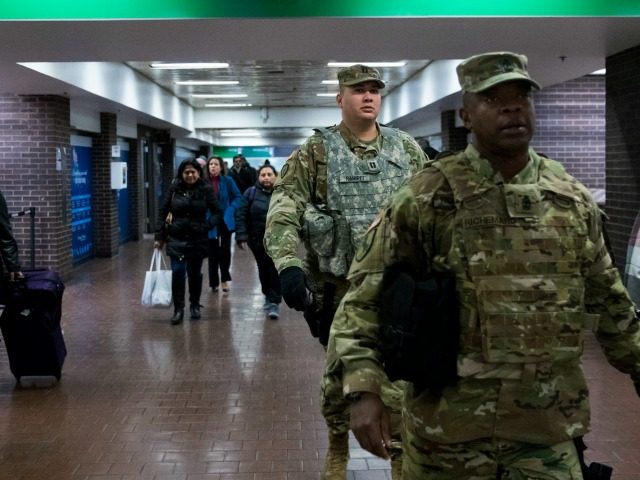The terror suspect who allegedly attempted to detonate a suicide-bomb in New York came to the United States from Bangladesh as a “chain migration” relative of an individual who had immigrated earlier into the United States.
In October, President Donald Trump called for an end to this “chain migration” process in his immigration principles.
On Monday 27-year-old Akayed Ullah, a Bangladesh national, injured three individuals when he allegedly tried to detonate a suicide bomb in New York City in a planned terrorist attack.
Ullah, as confirmed by the Department of Homeland Security (DHS), entered the U.S. in 2011 as a chain migrant.
Under “chain migration,” new immigrants to the U.S. are allowed to bring an unlimited number of poorly-screened foreign relatives with them, creating a never-ending flow of immigration from some terror-ridden countries.
Ullah came to the U.S. through the F43 visa, allowing him to obtain a Green Card simply because his father’s brother or sister had recently been naturalized as a U.S. citizen. This process is known as “extended-family chain migration.”
.@DHSgov can confirm that the suspect was admitted to the United States after presenting a passport displaying an F43 family immigrant visa in 2011. The suspect is a Lawful Permanent Resident from Bangladesh who benefited from extended family chain migration.
— Tyler Q. Houlton (@SpoxDHS) December 11, 2017
JUST IN: 27 y/o Terrorist who is from Bangladesh and was living in Brooklyn, told authorities “They’ve been bombing in my country and I wanted to do damage here, Terrorist was also a cab driver. pic.twitter.com/vhtfzadgoc
— NYC Scanner (@NYScanner) December 11, 2017
Trump has repeatedly demanded an end to chain migration, saying “Chain migration is a disaster for this country and it’s horrible.”
.@POTUS: "Chain migration is a disaster for this country, and it's horrible." | Catch the full interview TONIGHT at 10p ET on @FoxNews. pic.twitter.com/0It6tw2rWI
— Fox News (@FoxNews) November 2, 2017
As Breitbart News reported, more than 140,000 Bangladeshi nationals — larger than the population of Dayton, Ohio — have entered the United States since 2005 for no other reason than to reunite with extended family members.
- 8,508 Bangladeshi nationals entered U.S. in 2005 as chain migrants
- 9,936 entered in 2006
- 7,765 entered in 2007
- 7,795 entered in 2008
- 12,974 entered in 2009
- 11,407 entered in 2010
- 13,136 entered in 2011
- 13,379 entered in 2012
- 11,346 entered in 2013
- 14,170 entered in 2014
- 13,034 entered in 2015
- 18,051 entered in 2016
- Since 2005, 141,501 Bangladeshi nationals have entered U.S. as chain migrants
This is the second time in three months that a foreign-born suspected terrorist entered the U.S. through an immigration program that Trump has called for the end to.
Another suspected ISIS-inspired New York City terrorist, Uzbek national 29-year-old Sayfullo Saipov who is accused of murdering at least eight individuals, entered the U.S. in 2010 by winning one of the 50,000 visas randomly allotted every year under the Diversity Visa Lottery.
The Visa Lottery dolls out 50,000 visas annually to foreign nationals from a multitude of countries. The countries include those with terrorist problems, including Afghanistan, Algeria, Egypt, Iraq, Lebanon, Libya, Nigeria, Saudi Arabia, Somalia, Syria, Trinidad and Tobago, Venezuela, Yemen, and Uzbekistan.
Trump most recently slammed the visa lottery, saying:
We want a system that is merit-based. They come in on merit, they don’t come in on a lottery system. How about the lottery system? Folks did you see that? That’s the guy in New York City. The lottery system where they put names in a bin… so what they do, I would say but more than just say, they take their worst and they put them in the bin and then when they pick the lottery, they have the real worst in their hands… and we end up getting them.
No more lottery system. We’re going to end that. We’ve already started the process.
We want people coming into our country who love our people, support our economy and embrace our values. It’s time to get our priorities straight.
About 9.3 million foreign nationals have come to the U.S. as chain migrants between 2005 and 2016, Breitbart News reported. In that same time period, a total of 13.06 million foreign nationals have entered the U.S. through the legal immigration system, as every seven out of 10 new arrivals come to the country for nothing other than family reunification.
This makes chain migration the largest driver of immigration to the U.S. — making up more than 70 percent — with every two new arrivals bringing seven foreign relatives with them.
Currently, only one in 15 foreign nationals admitted to the U.S. come to the country based on skills and employment purposes. Though roughly 150,000 employment-based Green Cards are allotted every year, half of those Green Cards actually go to the foreign relatives of employees.
Since 2005, the U.S. admitted 80,252 chain migrants from Iran, despite the nation being listed by the U.S. State Department as a sponsor of terrorism.
John Binder is a reporter for Breitbart News. Follow him on Twitter at @JxhnBinder.

COMMENTS
Please let us know if you're having issues with commenting.